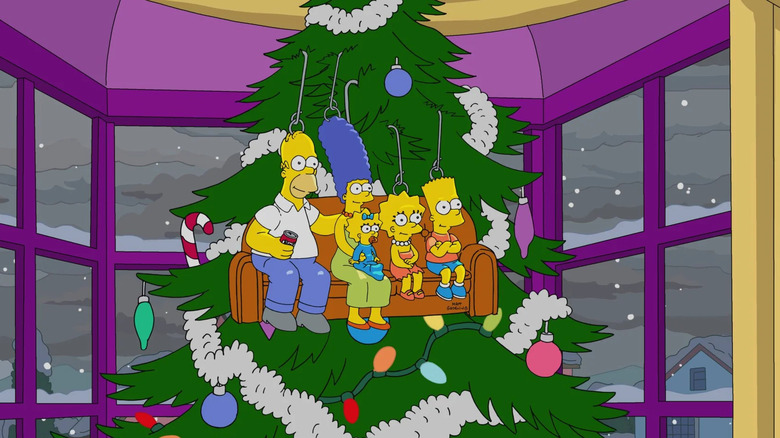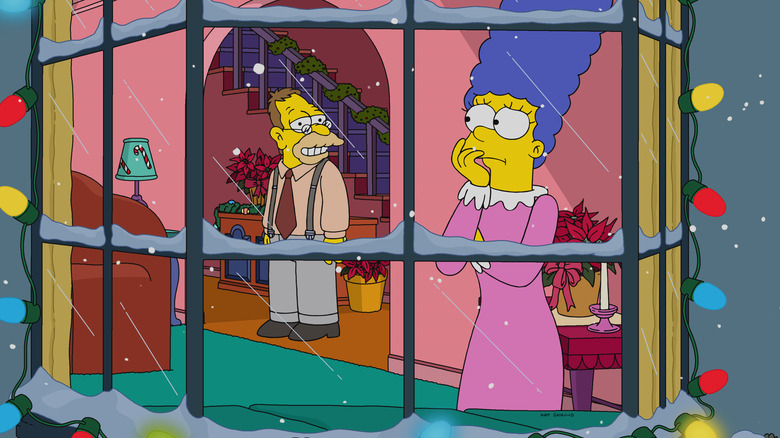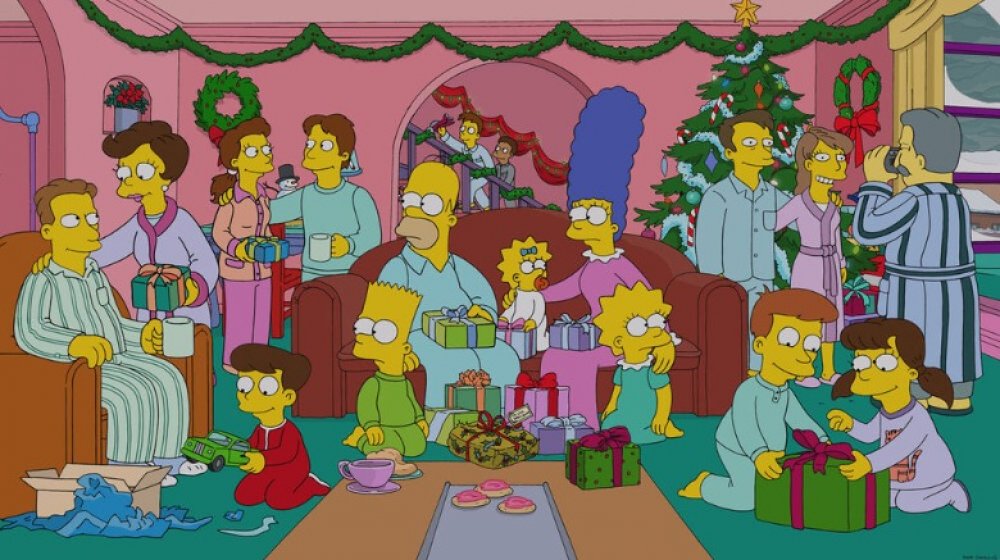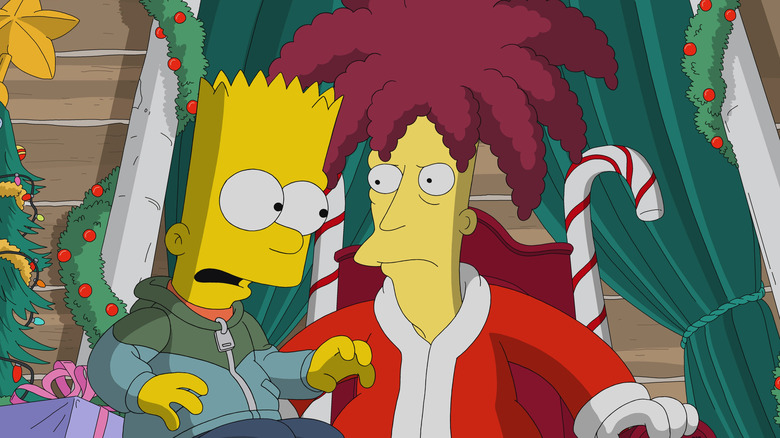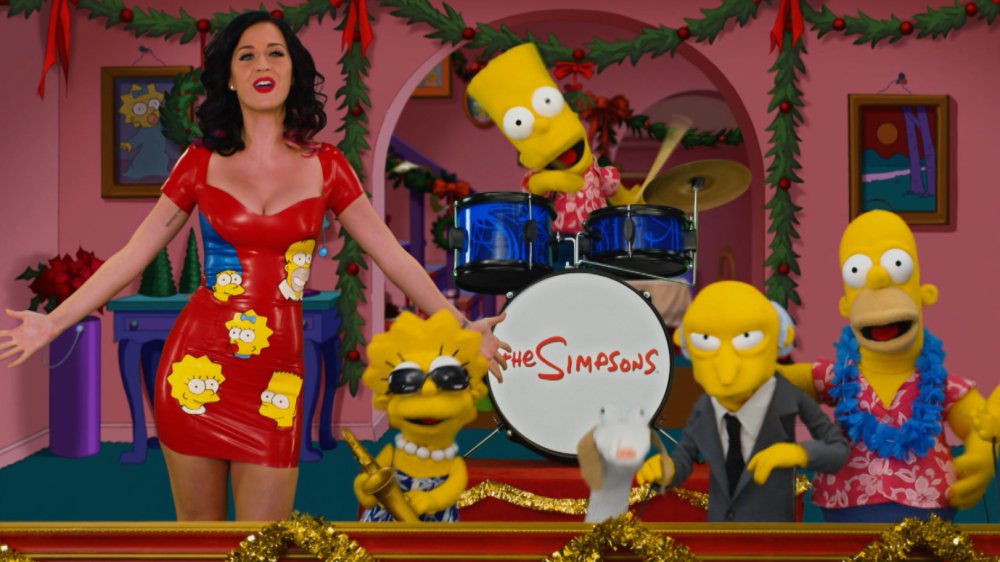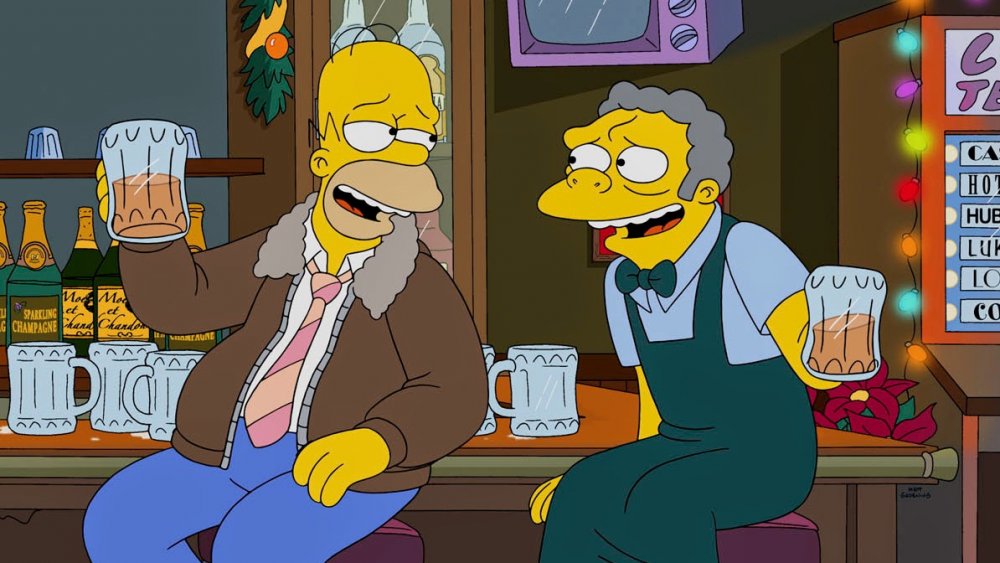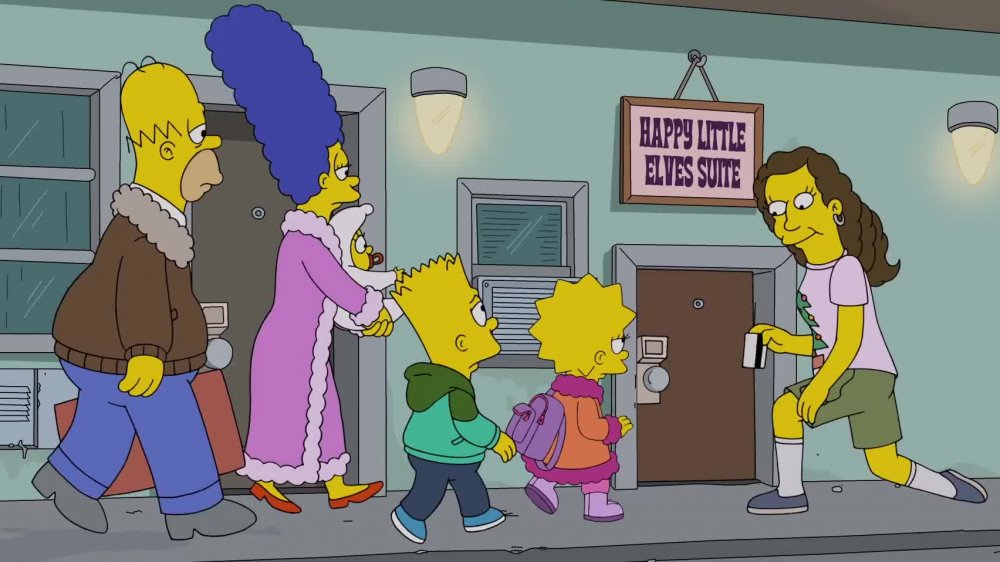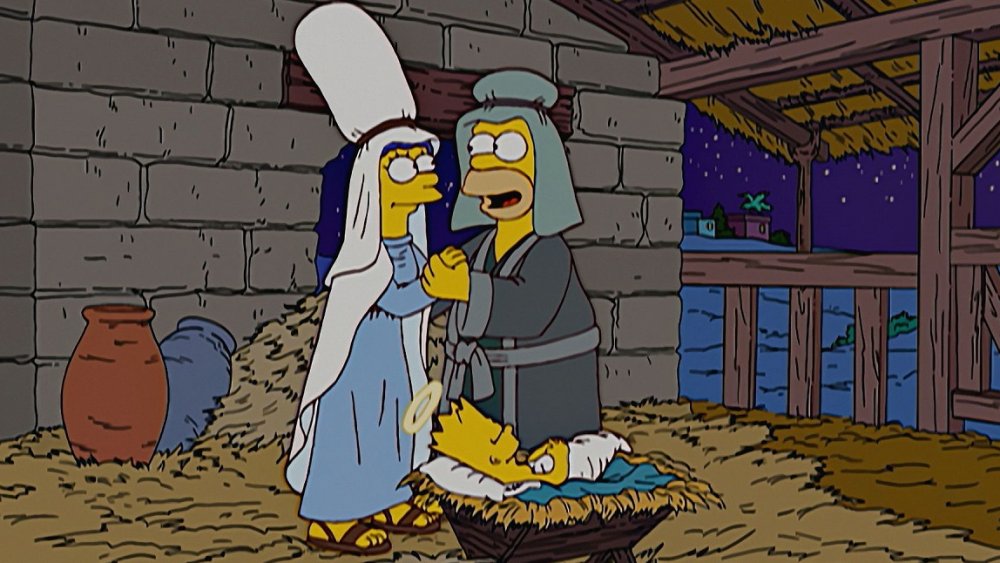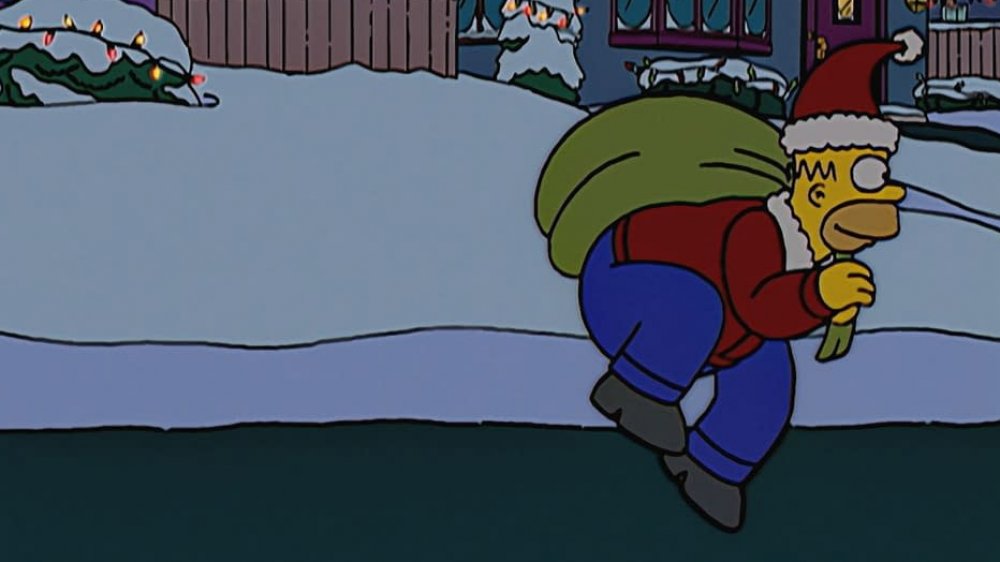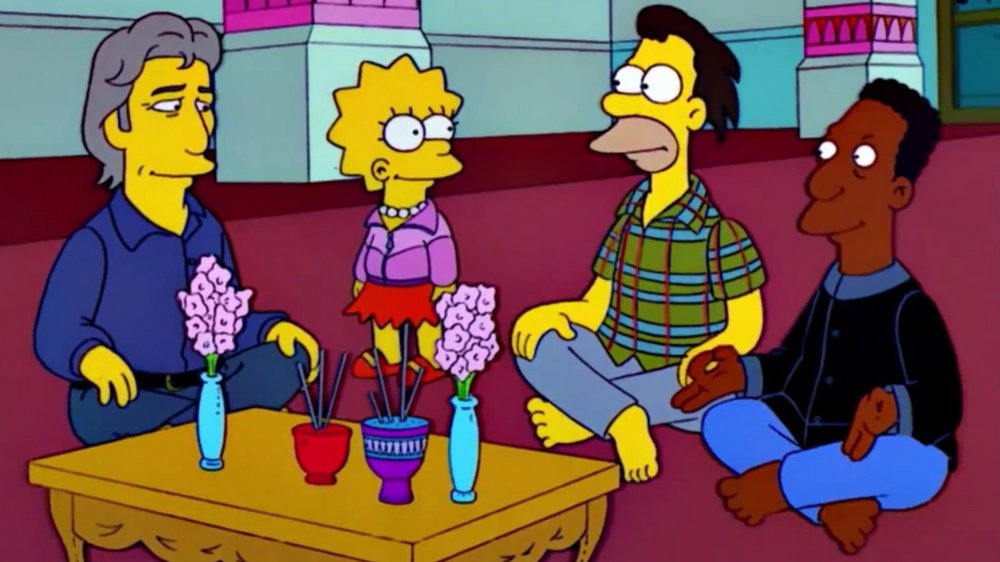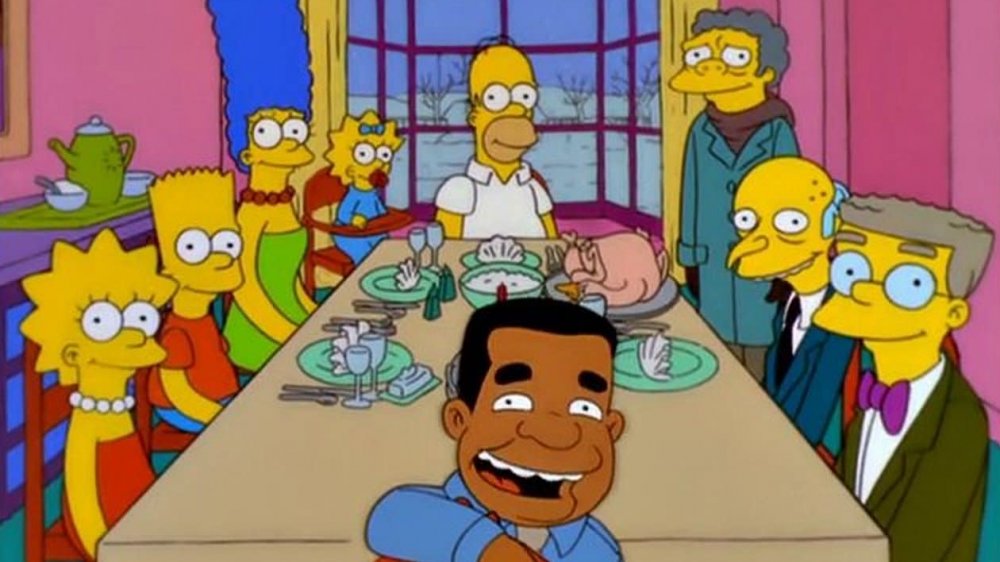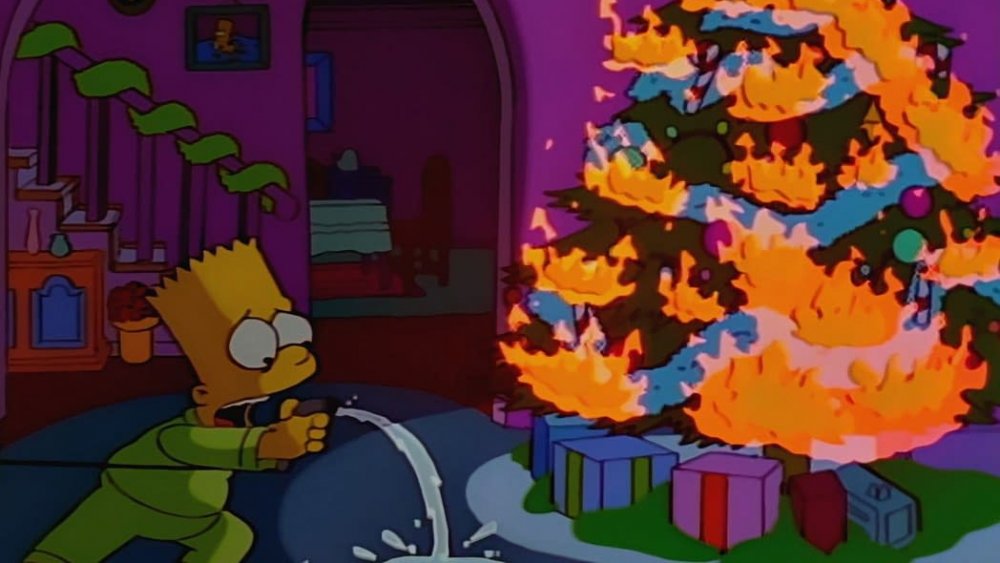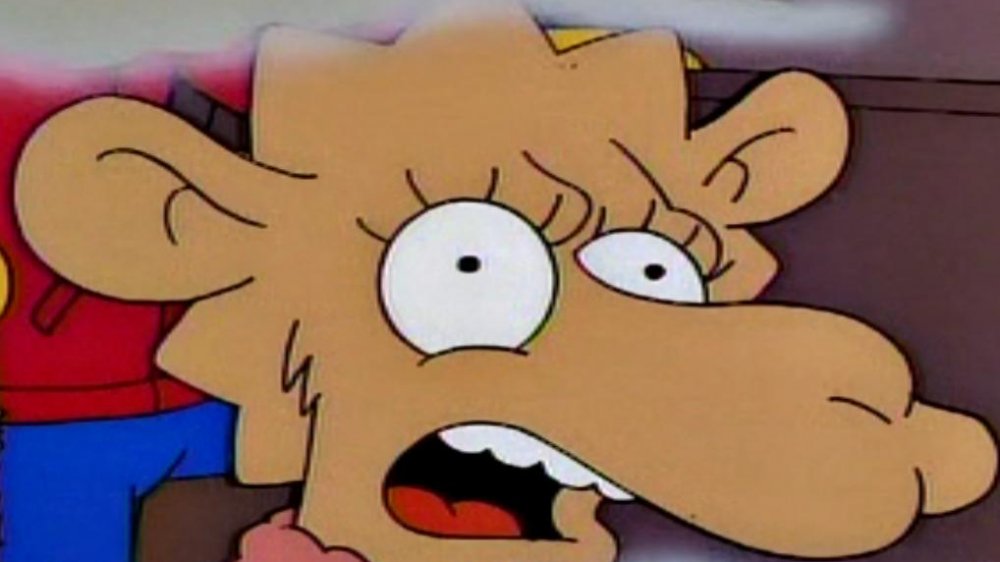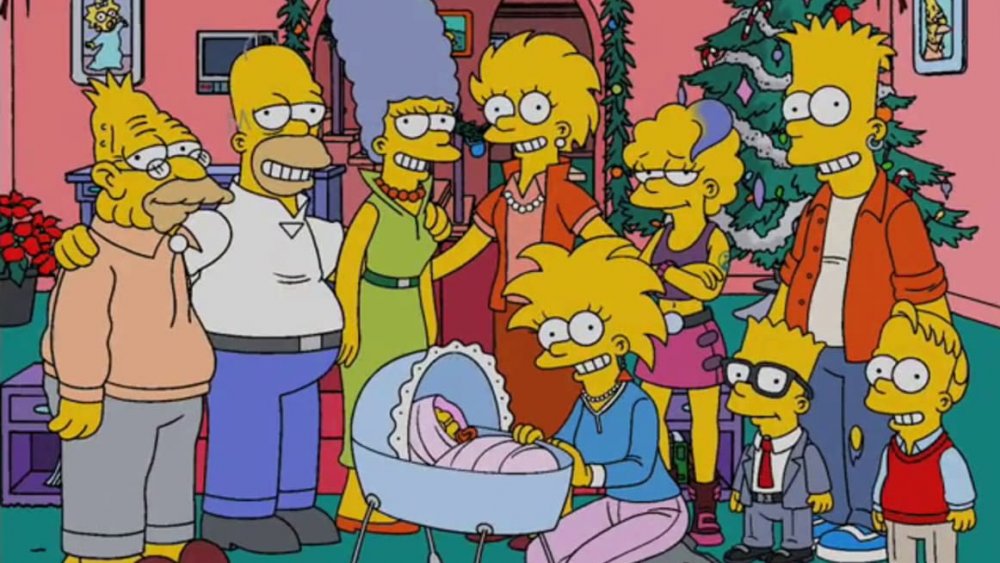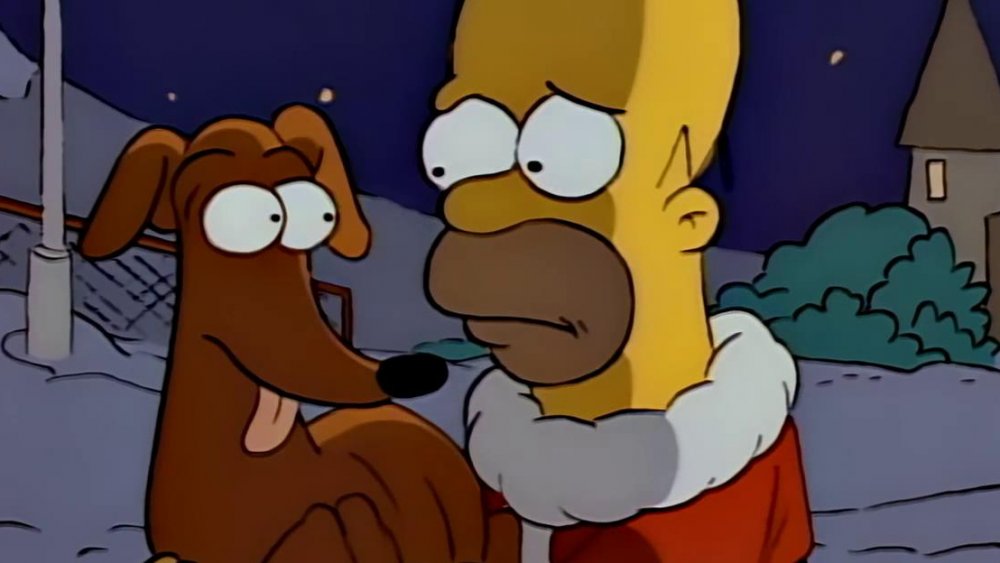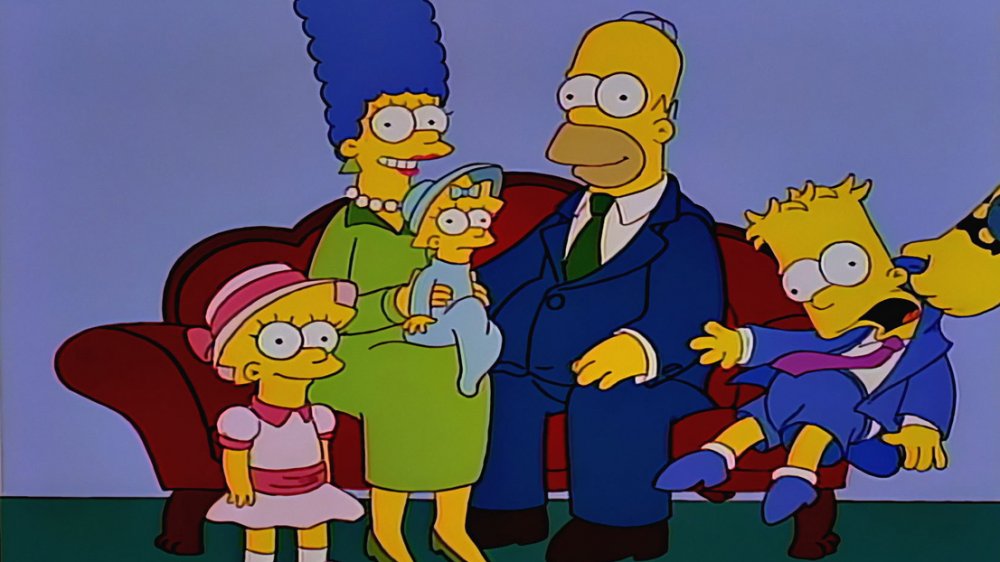15 Best Simpsons Christmas Episodes Ranked
It would be an understatement to say that holiday specials are part of the DNA of "The Simpsons." The annual Treehouse of Horror special is a tradition deserving of its own list, but let's not forget that the very first episode of the longest-running animated comedy in history is indeed a Christmas episode. The saga begins on that wintery night when the Simpson family finds their dog, Santa's Little Helper.
Christmas episodes are not annual occurrences for "The Simpsons," but during the 35 years it's been on the air, the Fox cartoon has seen its share of takes on the sitcom tradition. A few of them weren't even good enough to make this list.
We used our best judgement to determine which episodes counted as Christmas episodes. Notably snowy episodes like "Mr. Plow" will not be found here due to the lack of holiday cheer. In order to determine the ranking, we looked at IMDb user scores and ordered the top 15 from lowest to highest based on the opinions of the most vocal and online "Simpsons" fans.
These and many, many other episodes of "The Simpsons" are available to stream on Disney+ and Hulu.
15. Manger Things (Season 32, Episode 16)
The most recent Christmas episode of "The Simpsons" as of this writing didn't even air during the holidays, yet it undeniably belongs on this list, even if it ultimately winds up at the bottom. This Season 32 episode begins with the Simpson family sitting around the living room fireplace and Christmas tree. As they gather 'round, Marge tells the tale of a Christmas party from years earlier where Homer found himself alone on Christmas.
After getting embarrassingly drunk and destroying the power plant at a holiday party, Marge kicks Homer to the curb until he gets his act together. No one else will take him in except for Springfield's local religious nut, Ned Flanders, and even there he isn't permitted to stay long. Then the episode takes a nonsensical turn where Homer is living in a secret attic in the Simpsons' garage.
All things considered, this is a pretty slipshod episode. When "Simpsons" humor doesn't land, episodes tend to feel like a bunch of random mediocre bits strung together by a threadbare plot. That's what we've got here with "Manger Things" and in its final attempt to tell a meaningful family story it falls completely flat.
14. White Christmas Blues (Season 25, Episode 8)
Thanks to climate change, it's much too hot for snow to fall throughout the vast majority of America ... with one improbable exception. As it turns out, pollution from Springfield's nuclear power plant combines with smoke from its perpetually burning tire yard and creates freak conditions allowing for snow. Ergo, an influx of tourists dash into town to experience a more seasonally traditional Christmas.
It's a decent enough 20-something minutes of television. But what we really want to know is did Damon Lindelof lift aspects of "White Christmas Blues" while creating the second season of "The Leftovers"?
"White Christmas Blues" involves a mob of randos from the rest of America rushing to Springfield due to a singular, somewhat mysterious phenomena. In similar circumstances, people flock to the town of Jarden, Texas, in "The Leftovers." "White Christmas Blues" premiered about six months before the pilot of "The Leftovers" dropped on HBO in 2014. It's possible Lindelof owes a huge debt to director Steven Dean Moore and writer Mike B. Anderson. It's equally possible (and maybe more plausible) that Lindelof hasn't watched a new "Simpsons" episode since the '90s and the slight resemblance is a coincidence.
13. Bobby, It's Cold Outside (Season 31, Episode 10)
While the title might lead you to think this is a "King of the Hill" episode, the "Bobby" it refers to is not Bobby Hill, but longtime "Simpsons" schemer and villain Sideshow Bob. This "Simpsons" Christmas episode aired in December 2019 and follows Sideshow Bob as he tries to rehabilitate his image yet again — this time by working as a Santa Claus at Santa's Village.
The Simpsons happen to visit the Village and Bart inevitably runs into the ex-clown assistant who has a homicidal urge to wipe the youngest Simpson off the face of the Earth. But Bob can't kill Bart because he is too committed to staying in character. Meanwhile, there's a mystery where someone is stealing packages throughout Springfield and leaving the initials "SB" at their crime scenes. In a twist of fate, Bart and Sideshow Bob team up to save Christmas in this mostly perfectly cromulent "Simpsons" episode.
There is one fatal flaw of this episode, and that is the inclusion of not one but two scenes of the Simpson kids in the car singing "Baby Shark." Some things can't be unheard.
12. The Fight Before Christmas (Season 22, Episode 8)
"The Fight Before Christmas" would go down as a pretty standard post-golden years "Simpsons" endeavor were it not for the final of its four Christmas-themed "Treehouse of Horror"-esque segments. To wrap the episode up, "The Simpsons" switches up its format over to puppetry, and the fam, plus Moe, all turn into full-on felt-and-stuffing, all-singing, all-dancing Muppets.
Having, at that point, been recently edited out of "Sesame Street" for dressing too much like Katy Perry circa 2010, Katy Perry stops by this 2010 holiday special to provide what we're pretty sure is the only live-action celebrity cameo in "Simpsons" history (or at least the only one we remember).
As if that wasn't already bonkers enough, Perry also participates in the closest thing to an NC-17 joke that has ever been uttered in "Simpsons" history. Good job, Katy Perry. Way to own your spot in "Simpsons" history to the max.
11. I Won't Be Home for Christmas (Season 26, Episode 9)
Penned by OG "Simpsons" writer and longtime showrunner Al Jean, "I Won't Be Home for Christmas" lacks anything that remotely resembles a rough edge. Marge is correctly enraged when Homer stays out too late on Christmas Eve. However, Homer only gets held up because Moe needs some company to help him through an extra-difficult spell of holiday-related loneliness. Once Marge hears this from Moe, all is forgiven, because Marge is not a psychopath.
This Season 26 episode makes plenty of gestures toward emphasizing the importance of family and togetherness and all that, but without any genuine conflict, the story glides through your brain without leaving much to remember it by. In one scene, Homer stumbles across Gil in a movie theater, which raises the question: Why is Gil in so many "Simpsons" holiday episodes? Gil also factors prominently into the very mediocre Christmas-oriented "Simpsons" installment, "Kill Gil, Volumes I & II." It seems bizarre that "Simpsons" Christmas seems to include a ton of Gil and not much of far more widely recognized and beloved characters like, let's say, Mr. Smithers, Barney Gumble, Patty and Selma, or Otto.
10. 'Tis the 30th Season (Season 30, Episode 10)
Once again, Gil rears his below average-looking, one-joke head into a "Simpsons" Christmas special. Stop trying to make Gil happen, "The Simpsons." It's not going to work.
In "'Tis the 30th Season," Marge rescues Gil from a trampling Black Friday department store dash and helps him secure a plush toy for his grandchild. Then Homer and the offspring decide to give Marge a break this year, and the fam heads to Florida. Again. The key difference is this time, Bart and Lisa can run around a motel in homage to "The Florida Project," a terrific 2017 film that did not exist yet when "Kill the Alligator and Run" first aired 17 years earlier.
"'Tis the 30th Season" marks yet another instance of "Simpsons" writers parodying the famous "horse head" scene in "The Godfather," which they've done more than once before. Man, "Simpsons" writers sure do love "The Godfather."
9. Simpsons Christmas Stories (Season 17, Episode 9)
This 2005 effort stands as the second anthology episode on this list ... or, if you count them in chronological order, the first. But we really need to put some emphasis on the second of the three stories, in which Grandpa explains why he very badly wants to kill Santa Claus. Season 17 probably isn't anyone's favorite batch of "The Simpsons," but this is a truly standout eight minutes.
Without giving too much away, the middle portion of "Simpsons Christmas Stories" features the first and last(?) appearance of Great Uncle Cyrus Simpson, who lives on Tahiti with his 15 wives and presumably several Simpsons cousins and second cousins. It's also got the line "It's Christmas! I want to shoot something!" as well as Mr. Burns stealing Santa's sleigh and trying to kill Santa but, quite like Grandpa, ultimately failing miserably. Tremendous.
The third story borrows a bunch of public-domain music from "The Nutcracker Suite" for the purposes of our amusement. The first segment is based on some obscure Bible story with which we are not familiar.
8. 'Tis The Fifteenth Season (Season 15, Episode 7)
It's a little strange that this one cracks the top 10 and certainly odd that it sports a higher IMDb ranking than some better episodes. Homer demonstrates ample selfishness by buying an expensive gizmo for himself, severely limiting the rest of the family's Christmas budget. Then he watches a copyright infringement-safe version of Mr. Magoo in a cartoon that mimics "A Christmas Carol" and decides to be the most charitable person in town instead of a selfish oaf. This development enrages Ned Flanders, because being charitable is sort of his deal.
Then Homer does the Grinch who stole Christmas by stealing everyone's presents because Lisa tells him everyone would be happier if society was a little less overwhelmingly materialistic. As a whole, "'Tis the Fifteenth Season" demonstrates how television writers can copy and paste pre-existing pop culture and tell everyone their intent was satire or homage, as opposed to simply admitting they had no new ideas.
"What you saw was 'A Christmas Carol,'" Lisa explains to Homer the morning after his Magoo-related revelation. "It was written by Charles Dickens 160 years ago." "TV writers have been milking that goat for years," says Bart. And that is what we call "lampshading."
7. She of Little Faith (Season 13, Episode 6)
Lisa converts to Buddhism, and we learn that Lenny and Carl have been Buddhists this entire time. It's a Season 13 shift in status quo the show occasionally remembers to honor in subsequent years.
This comes about when Mr. Burns pays for repairs at Reverend Lovejoy's church with the caveat that Springfield's most frequently seen place of worship must become absolutely loaded with advertising. Grossed out by the feckless capitalism and trivialized spirituality, Lisa abandons Christianity for reasons totally unconnected to Christianity itself. Once again, "The Simpsons" stumbles into the paradox that sinks multiple other episodes: It wants to use religion for comedic purposes but must honor an imperative to never, ever suggest that mainstream religion is funny. Luckily, "She of Little Faith" doesn't feel like too much of a strategically inoffensive cop-out.
During the episode's second half, Marge's campaign to lure Lisa back into Jesus' flock gets so manipulative that even Homer shoots her an incredulous glance, making this a rare "Simpsons" episode in which Homer plays the voice of reason to Marge's unhinged reactionary.
6. Grift of the Magi (Season 11, Episode 9)
Maybe it's unfair to expect this much consistency from on-screen events that occurred two years apart in real time. But we literally just wrote a blurb about a Season 13 episode in which Mr. Burns invests in a Springfield institution and brings about catastrophic results. In the 11th season's "Grift of the Magi," Kid First Industries bails out Springfield Elementary, and quite like the case of "She of Little Faith," commercialization runs totally amok.
Quite unlike "She of Little Faith," the celebrity cameo feels inspired and purposeful, in contrast to Richard Gere's route walk-on. It's hard to say how many members of the television-viewing public under 40 years old have ever seen "Diff'rent Strokes." But if we're going to recognize Gary Coleman for anything, let us remember him as one of the all-time great one-off "Simpsons" characters, just like Frank Grimes and Stampy the Elephant.
5. Miracle on Evergreen Terrace (Season 9, Episode 10)
Bart accidentally melts the family's plastic Christmas tree, thus destroying all the presents underneath. So this is a little like that time he ruined Thanksgiving by knocking Lisa's table centerpiece display into the fireplace seven seasons earlier. But "Miracle on Evergreen Terrace" has a little more confidence in its own noble goofiness and doesn't play out with the earnestness of Season 2's "Bart vs. Thanksgiving."
Bart blames the whole fiasco on an imaginary burglar, and after Homer learns the truth, he issues the following statement via the media: "Hello, jerk," he begins. "We may never find you, and everyone should probably stop looking. But one thing's for sure. You do exist." High-larious.
The final three minutes, in which the rest of the town righteously loots 742 Evergreen Terrace, are handedly the funniest few of the 23 total. "If you're heading for the medicine cabinet, I've already been there," Krusty informs Otto as they cross paths on the stairs. So much for Bart's Adderall prescription. Hopefully he's due for a refill soon. Otherwise, he won't be finishing any homework assignments at all.
4. Skinner's Sense of Snow (Season 12, Episode 8)
The Cirque du Soleil segment that launches this episode inspires its share of chuckles, but overall, "Skinner's Sense of Snow's" 7.9 IMDb ranking might be attributable to the fact that it premiered during Season 12, back when there was still hope that the show's dip in quality was only temporary. As a result, fans remember this one as a worthier entry than it actually is.
A blizzard traps Bart, Lisa, and several other young'uns at Springfield Elementary during the final day before winter break. Most of the gags revolve around Principal Skinner's futile attempt to maintain order. There are a few apparent lapses of in-story logic, and not necessarily the kind we can hand-wave off just because it's a cartoon: Lisa revels in anti-establishment chaos in a manner that clashes with the highly respectful attitude toward the education system she usually displays, and Skinner spends much of the episode's second half stuck in a dodgeball bag that doesn't seem like it should be able to bind an adult human man.
Speaking of Skinner's adulthood, this animated trifle aired in 2000 and states his age as 40. But in a flashback, it also depicts him as an adult soldier during the Vietnam War, which ended in 1975. We realize Bart would be around 40 if anyone in Springfield aged normally, but come on.
3. Holidays of Future Passed (Season 23, Episode 9)
Y'know what people love? The feels, man. The people wanna get all the feels, and "The Simpsons" brings all the feels and then some with Season 23's holiday sojourn. We've got to wonder if that's why when it comes to Simpsons Christmas specials, IMDb rankers place this one below only undisputed all-time TV classics, even though most of it isn't especially funny.
"Holidays of Future Passed" certainly resonates more closely with "Lisa's Substitute" than "Marge vs. the Monorail" in the respect that, unfortunately, the unique premise didn't inspire much in the way of memorable jokes. But we defy you to watch Bart confessing to Lisa that she's the person he always wished he could be without crumbling into a blubbering mess of sentimental goo.
The episode also features ungrateful Simpsons grandkids, an army of horrible adult Ralph Wiggum clones that die as easily and hilariously as the MeeSeeks from "Rick and Morty," and an unusually optimistic vision of Homer as an old man. It would've made a satisfying series finale, but alas, we still must worry that "The Simpsons" will never end on a conclusive note and that Fox will continue cranking out new episodes until the lone surviving original cast member collapses from a fatal cardiac event midway through recording Season 67.
2. Simpsons Roasting on an Open Fire (Season 1, Episode 1)
The series premiere of the longest-running scripted television show in the history of the medium almost feels too historic to be contextualized as one of several holiday-specific "Simpsons" episodes. But then again, it is very much a "Simpsons" holiday special, even if it might also be other things of equal or greater significance.
It took "The Simpsons" until roughly eight episodes into Season 2 to really figure itself out and rise to the immaculate level we associate with '90s "Simpsons," but "Simpsons Roasting on an Open Fire" certainly contains hints of the absurdity, heart, and irreverent self-awareness that was coming down the pipeline. Eh, maybe "hints" is putting it too lightly. Homer's stint as a mall Santa is very absurd. Bart dialogue like "If TV has taught me anything, it's that miracles always happen to poor kids at Christmas" is very irreverent and self-aware. And the family's decision to give Santa's Little Helper a forever home, even though he failed to win them a dime at the racing track, checks off the heart box, for sure.
1. Marge Be Not Proud (Season 7, Episode 11)
Ironically, the top-ranking "Simpsons" holiday episode isn't really about Christmas. To put it more precisely, it's not addressing boilerplate, generalized themes about family or togetherness. Instead, it's a definitive Bart episode, with Christmas functioning as a plot device. The eldest Simpson child gets busted shoplifting a video game and Marge responds as if it's the worst thing he's ever done.
Sure, Bart caused an international incident as recently as the previous season, but in terms of the kind of non-fantastical, plausible mischief that a 10-year-old boy could commit in real life, ripping off the Try-N-Save is his greatest transgression. Bart puts actual effort into reestablishing the doting mother-son dynamic he rejects at the beginning of the episode when he claims that he's "not a little kid anymore," because while he's happy to play the part of his generation's Dennis the Menace, he doesn't want his mayhem to go too far and alienate his mom. Or, for that matter, his audience.
"Marge Be Not Proud" establishes a rule "The Simpsons" has more or less followed since: Bart's shenanigans must remain either too over-the-top and cartoony for reality or too harmless for anyone to take seriously. Bart doesn't commit adult crime, and this is probably the way it should be. There are plenty of other television shows that explore the darker sides of juvenile delinquency; "The Simpsons" can just do its own thing.
